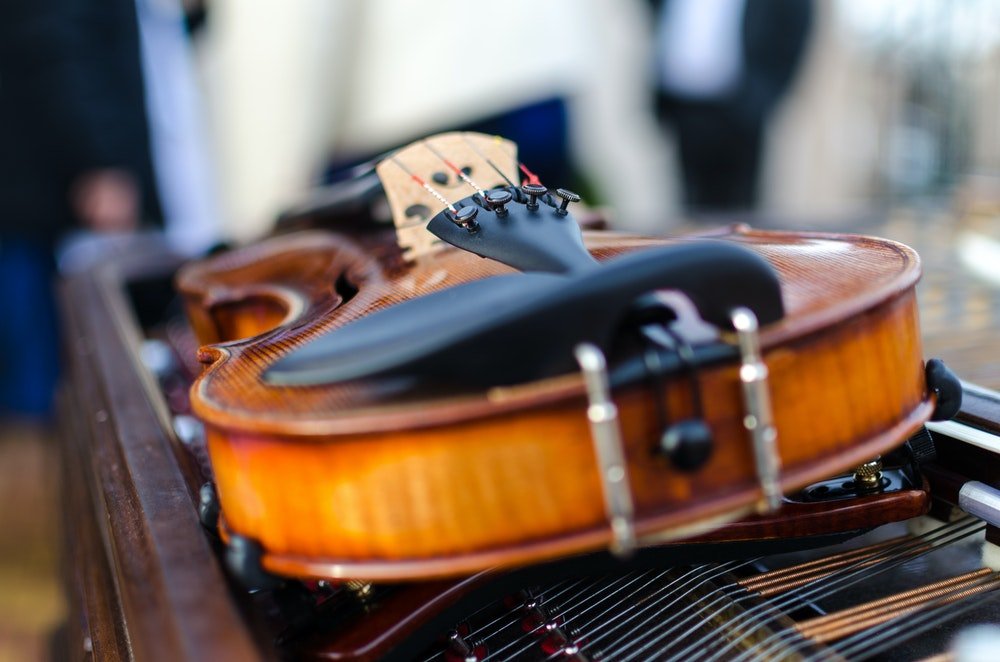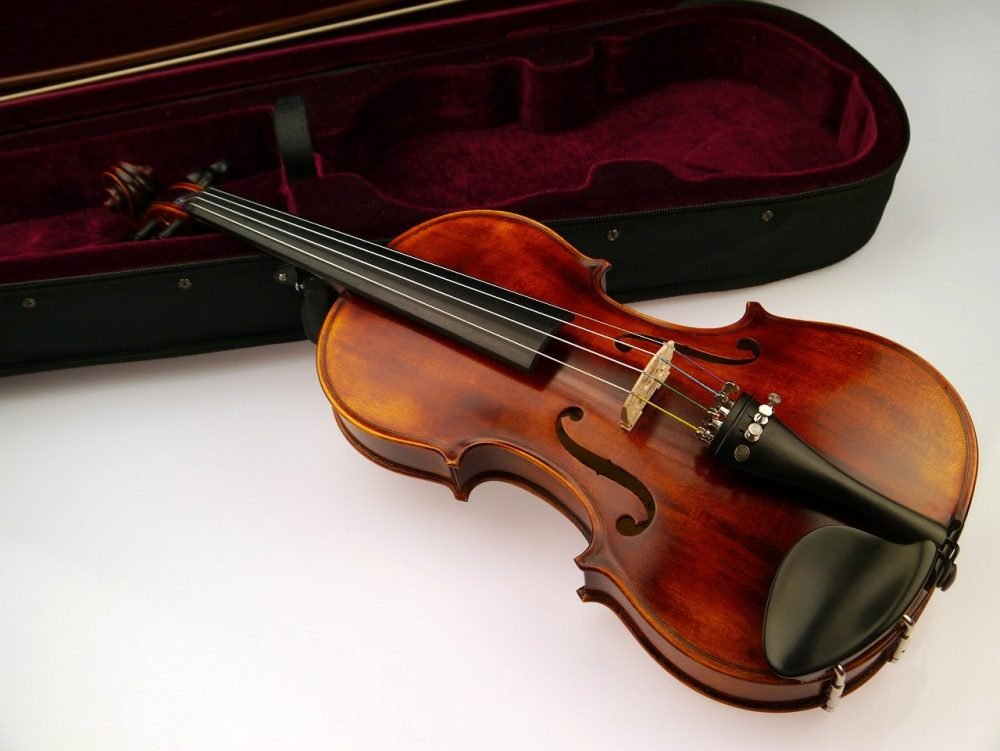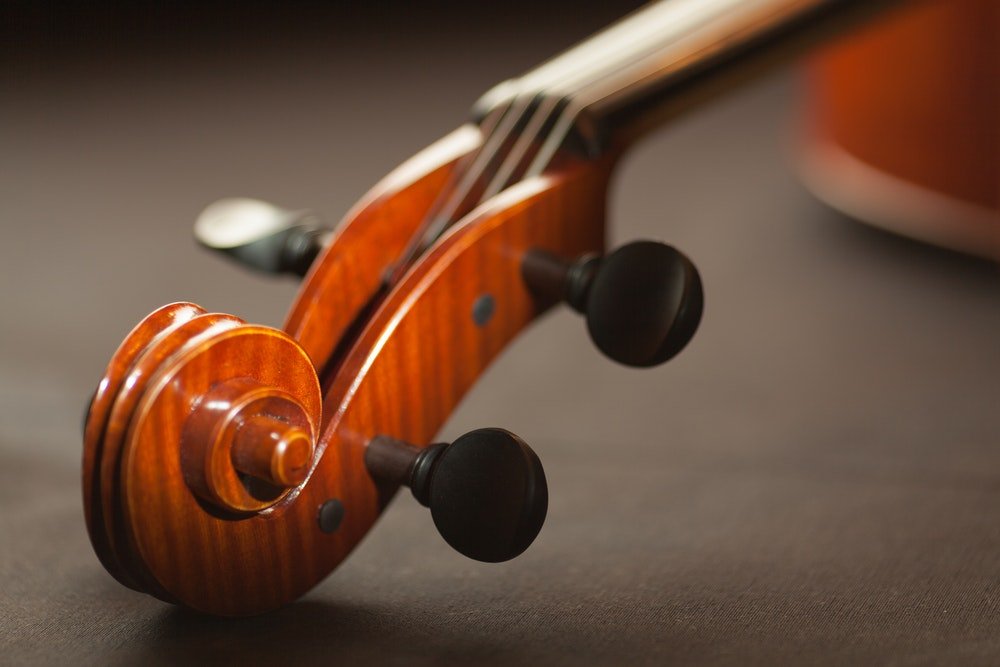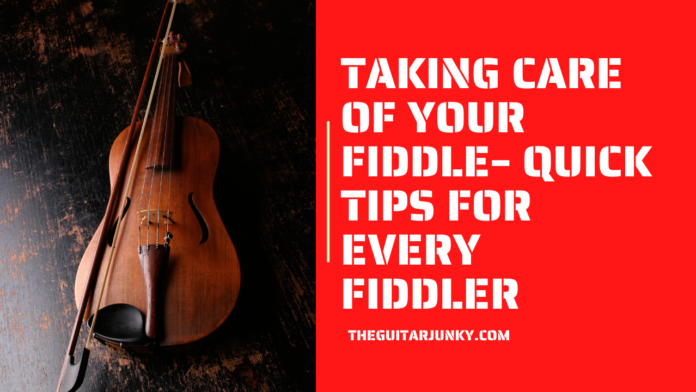Fiddles or violins do not only make one of the loveliest sounds on the planet. They are also some of the world’s most durable musical instruments. For example, Amati, Guarneri, and Stradivari fiddles can survive for several centuries.
As a matter of fact, these bowed string instruments can outlast even its owners.
That is if you know how to properly care for it. Luckily, we are here to give you the 10 easy tips for caring for your violin.
Contents
10 Tips To Taking Care of Your Fiddle
1. Always store your fiddle in a good quality case.
Caring for your violin starts with a good quality hard case. This is not a guitar that will feel at home in a flimsy gig bag. The case should have sufficient padding to absorb vibration and impact forces. The mold should snugly fit your fiddle.
It should not be a very tight fit to prevent the surface of the mold from scratching the delicate surface of your violin. There should also be a strap that will secure the neck to prevent the violin from shifting in its position.

2. Store your violin in the correct place.
Getting a good quality violin case is one thing. It is a different matter where you are going to store your violin when you are not fiddling with it. Your fiddle does not do well in temperature extremes. Here is a good rule of thumb to follow: treat your violin like a person.
If you feel very hot, then the environmental temperature can also be detrimental to your fiddle. Likewise, if it is freezing outside, your fiddle can dry and turn brittle. Prolonged exposure to cold and dry weather can lead to the formation of cracks in the violin. It is sensible to use a humidifier in the area where you intend to store your violin.
3. Apply rosin in a judicious manner.
If you are only beginning to play the violin, there is a good chance you still do not have a clue as to why you need to apply rosin. This is to allow the bow to create a friction against the strings. This is necessary to vibrate the strings more clearly. Now, just because you need rosin does not mean you should be generous in its application.
Too much rosin can produce scratchier or harsher sound. You will also have excess rosin dust on the body of the violin. More importantly, excessive application of rosin can reduce the bow hair’s lifespan. Repairing the bow hair is an expensive proposition.
4. Wipe the rosin dust off the violin strings and the fiddle after every use.
Even if you apply the right amount of rosin on your bow hair, you will still get rosin dust on the body of your fiddle and on the strings every time you play. It is important to wipe the dust off after every use and before you put your violin and bow in their case.
When wiping the rosin dust off your violin, it is best to use a clean, soft, and lint-free cloth. Leaving the rosin dust on the violin body can ruin the mirror finish of the fiddle.

5. Avoid harsh cleaning agents.
There are many cleaning kits formulated especially for violins and bows. These contain ingredients that will never strip the varnish off your instrument, while also leaving a protective layer.
You can also purchase a special wax to retain the glorious shine of your violin. Do take note that you should have a separate piece of cloth for polishing and cleaning. In general, all your violin really needs is regular cleaning using only a piece of clean, soft, and lint-free cloth.
6. Do not forget to clean the bow.
In addition to wiping off the rosin off your violin and bow after every use, it is also wise to clean the bow after every 3 to 4 days of use. You can use the same cleaning cloth for your violin if the bow came together with the fiddle when you bought it. If not, then you may want to have a separate cleaning cloth for your bow.
7. Pay attention to the fit of your pegs.

The quality of sound that a violin produces depends on several factors. One of these factors is the correct fitting of the pegs. If they are too tight, tuning your violin can be difficult.
You can apply a little amount of peg ‘lubricant’ to the tuning peg to help loosen it a bit. This should allow you to tune your violin. If the problem is that the pegs slip when you attempt to tune your instrument, you may want a luthier to examine and fix your violin.
8. Always clean the strings before winding them correctly.
The beautiful sound of your violin results from the vibrations of the strings. Dirty strings will produce a less-than-pleasant sound. Hence, if you are going to clean your violin, make sure to clean your strings, too. Loosen it up first.
Wipe the strings with a clean piece of cloth. Make sure to wind the strings correctly afterwards. If not, you risk damaging the peg box.
9. Use only fittings that are appropriate to your instrument.
There are three important fittings for violins, including the tailpiece, chinrest, and tuning pegs. Choose the right tuning pegs to prevent peg slippage. It is also important to choose a chinrest that will never touch the tailpiece of the violin to prevent creating a buzzing noise when playing the fiddle.
Most fiddlers use a wooden tailpiece with a maximum of two fine tuners. Using three or four fine tuners can mute the fiddle’s tone and produce a not-so-lovely sound. If you have to use four fine tuners, then pick a plastic tailpiece.

10. Always trim your nails and clean your hands whenever you play your violin.
Clean strings produce beautiful sounds. Clean violin safeguards the beautiful finish of your fiddle. That is why it is critical to keep your nails trimmed at all times. You do not want your nails digging into the fingerboard.
In addition, dirty hands can introduce dust and dirt into the strings and on the violin. The same thing occurs on the bow. Do not ever touch the bow hair. Your skin’s natural oils can negate the action of rosin.

Absolutely fantastic post on the violin, good posts on it are hard to come by and you really nailed all the points. As the violin is one of the most prolific instruments in music there is a lot of misinformation online about it and some of the tips can be incorrect. If you would like to check out some tips on the violin, please check out our post on it, written by pro-violinist, Fiona Gibbs.
Thank you so much
Mo